Agatha on screen: pt 2
A countdown of the worst Christie adaptations
And now, after yesterday’s First XI, things get serious…. with an elongated version of last year’s ten worst Christie adaptations. Which comes in two parts, because I got somewhat carried away and it is way too long for one post.
Agatha on screen is, almost always, grievously disappointing, to the point where one could do a bottom fifty with ease, but I have ignored the truly obvious shockers. There is no point in ‘critiquing’ the made-for-TV-movie of A Caribbean Mystery (1983) in which Miss Marple attends a hotel dance wearing a pirate mask; nor The Alphabet Murders (1965), a beyond-a-bad-joke riff on The ABC Murders, in which Anita Ekberg (formerly of the parish of Fellini) takes the role of ‘Amanda Beatrice Cross’. Tony Randall plays Poirot, replacing MGM’s original choice of Zero Mostel, who perhaps lost the gig after stating publicly: ‘I’ll certainly give him an eye for the girls. He solves his cases – but there are usually eight corpses strewn about before the end, so he obviously isn’t so bright.’
The Alphabet Murders is probably now a cult film, but as we know ‘cult’ is often another way of saying ‘terrible’.
Anyway: no point in listing such horrors. Instead, bar a couple of exceptions, I have picked adaptations that had hope of being good - and indeed a couple of them are actually regarded as good. I shall explain why I disagree, and why I think they fall short of what a Christie adaptation ought to be. As yesterday, it is all very subjective! Although number one is again, I feel, pretty unarguable… So here, counting down, are numbers ten to five.
Sparkling Cyanide (2003)
I wrote an article about this TV film when it was broadcast, which helped to establish friendly relations with Agatha’s daughter, Rosalind, whom I had the immense pleasure of meeting when she lived at Greenway House (she died in 2004). She thought the show ill-conceived; as did I. She was a fiercely loyal purist about her mother’s work - always sought to do what she believed Agatha would have wanted, which meant preserving the integrity of the original material - and objected to the way in which this 1945 book had been uncomfortably yanked into the noughties world of personal trainers and football agents. Meanwhile the murders are solved by an entirely invented middle-aged couple working undercover for MI5 (the original has no formal detective). As played by Pauline Collins and Oliver Ford Davies, they were rather charming, although around them the whole thing looked like a hollow spin on an extremely sophisticated novel, with athleisure replacing Norman Hartnell and CCTV instead of grey cells; as with a production of Don Giovanni set in a betting-shop, one is simply watching to see how the transposition works, not because there is any point to it.
I am not a complete purist. I can live with tampering, if it is done right. I used to know a very nice journalist, who would ring me occasionally asking for an enraged quote about the latest adaptation, expecting my knitting to unravel (as it were) over things like the omission of Ariadne Oliver, or the occasional gender swap - I always felt bad about being indifferent to these minor transgressions. I actually could not abide the over-fidelity of the early Poirots, all those spats and hired-for-the-day Lagondas.
In which spirit I rewatched this Sparkling Cyanide, all ready to admire the fact that, more than twenty years ago, somebody had had the chutzpah to cast off the chintz and tell cosiness where to stuff itself.
Unfortunately the problem with it remains, just as in 2003, which is that it is so in love with its modernizing mission that it commits the worst crime of all: excepting an occasional flourish from the Collins-Ford Davies double act, it is very very boring.
Murder, She Said (1961)
Last time around, my anti-Rutherford stance caused the Substack version of a dust-up: that is to say, opposing views were set out in the most courteous possible way, and Substack writers whom I greatly respect advised me to watch Murder, Ahoy! on a Sunday afternoon, with a large glass of something mellowing, and to keep an open mind. Which I did, and my mind remained open but alas unchanged.
It isn’t that Margaret Rutherford is mad casting as Miss Marple (no madder than Albert Finney). Obviously she is physically wrong, with her lumbering active gait, her Tom Baker scarves and her large face, on to which she crams a hat like a mangled flowerpot. But she is so adorable, and her voice is so enchanting, and her theme tune is so silly and jolly, that I am all set to think this has to be fun - until it isn’t. It is truly a shame how bad the films are… and this, the first of them, is an adaptation of 4.50 from Paddington, a weak book which therefore (paradoxically) might have allowed MGM (the culprit) more scope to do something good.
However: ‘Frankly, it’s pretty poor!’ was the judgment of the author herself (who had seen it at the Regal cinema in Torquay) and who am I to disagree. If only she had known that future salvation lurked, in the form of Joan Hickson, who features in a minor role! Of course it should be the kind of thing that one can settle in and enjoy on a rainy afternoon - ninety minutes of never-never-land Englishness, plus actors from that well-scoured melting pot of rep and Rank - yet whenever I try it I find myself yearning for a bit of Tarkovsky, or maybe Spike Lee, lest I drown in tweedom, stingless.
The 1960 MGM deal, in which forty Christie properties were sold for $75,000 - including the Marple books that became the Rutherford vehicles - now seems like a very bad deal indeed. ‘I really feel sick and ashamed of what I did when I joined up with MGM’, wrote Agatha in 1964. ‘One does things for money [in fact it went in tax] and one is wrong to do so – since one parts with one’s literary integrity.’ Rosalind’s fiery anti-tampering stance may have proceeded from the fact that she was a close witness to her mother’s real distress, which now of course seems excessive - these are just bits of cinematic merriment - but felt to Agatha like a betrayal of trust. ‘I don’t suppose there could be any misery greater for an author than to see their characters completely distorted.’ What really shocked her was when she discovered that MGM could write scripts of their own around Miss Marple, as with Murder Ahoy! ‘That, neither I nor Rosalind seem to have known…’
The simple problem, to my mind, is that Miss Marple is not a ‘comic’ character. Yet that is what MGM forced her to be, and moreover in deeply unfunny films. Murder at the Gallop (1963) set the novel After the Funeral partly in a riding school (‘random’ doesn’t begin to cover that); Murder Most Foul (1964) made merry hell with Mrs McGinty’s Dead; and always, throughout, we have the straight-man foil in the form of ‘Mr Stringer’, an old dodderer played by Margaret Rutherford’s husband. Imagine the contract negotiations. Mr Stringer reminds me of a line from the immortal Clive James, about a rather desperate eighties comedy double act, comprising a manic clown prancing around a straight man who was not, as James put it, ‘pretending to be just standing there. He is just standing there.’
Agatha did really like and admire the sweet, gifted Margaret, whose acting constantly hints at what more she might have done with the part, and dedicated to her the 1962 novel The Mirror Crack’d from Side to Side. ‘I can assure you that this is one of the proudest moments of my life,’ was the response. ‘I am glad you were really so pleased with my performance, as no one but yourself really knows what “Miss Marple” is like – I just put myself in her hands, with faith, and let her do the rest – and very happy she made me!’ This was particularly poignant given that, even as Margaret was expressing her desire to continue in the role, Agatha was working away behind the scenes, doing her utmost to get the films stopped.
Eventually, with Murder Ahoy!, the agony ended.
Farewell Mr Stringer.
The Man in the Brown Suit (1988)
This 1924 novel should be a gift to the screen: a thriller-cum-travelogue, based upon Agatha’s year spent touring the former dominions with her first husband, Archie. (A journey recently repeated by Sir David Suchet. Nice gig). The book also has rather delicious comedic characters, a sexy romance, and an action woman central role.
However: what we have here is a contemporary made-for-TV movie - flat, over-bright, majestically atmosphere-free, as only the eighties can do - which turns the lead, one of Agatha’s genuinely spirited 1920s females, into an ‘intrepid’ Anneka Rice tribute act, running around in shorts and getting into scrapes from which the viewer does not wholeheartedly wish her to be extricated.
For some reason this harmless little film has lived in my memory as a totem of awfulness (although it does feature Nickolas Grace, my dream Poirot, in a minor role).
Murder is Easy (1982)
More eighties tripe, with a marvellously cheap-looking eighties titles sequence, and this time the ‘contemporary’ setting means that there is much deployment of modern technology: a computer is used to solve the murder (and gets it wrong, which should have told us all something).
The leads, Bill Bixby and Lesley Anne Down (resplendently beautiful in the power suits that she wears for country strolls), have an almost mesmerizing lack of chemistry. But the rest of the cast makes one feel that it could have been better: Helen Hayes (soon to play Miss Marple in a pirate mask); Freddie Jones; Timothy West; Jonathan Pryce; and Olivia de Havilland, no less. Murder on the Orient Express, made-for-TV style.
What perplexes is why nobody has ever done a good version of this novel, which always strikes me as the most screen-worthy of them all. No detective, glorious character-based plot, richly-peopled village setting. One could do wonders with it, merely by leaving it alone. Again I ask myself: why is that so hard to do? Instead of which the book has engendered an 2009 adaptation that became a Marple, through which Benedict Cumberbatch wandered with the polite disinterest of one on the cusp of major stardom, and which introduced an ill-making incest theme; and the 2023 BBC adaptation, which was dire and politicized and made the village a repository for Mosleyites; thereby missing the central Christiean point that it is far more interesting to smile and smile and be a villain, than simply to be a villain.
By comparison the 1982 version is quite respectful towards the original, despite the updating. It teeters upon the enjoyable, if one’s standards are kept good and low.
Murder on the Orient Express (2017)
Look. What do I know. According to imdb, this Kenneth Branagh film grossed $352,794,081 worldwide, which is the perfect riposte to my plaintive question: why a remake?
But I hold the view that some adaptations are, if not perfect, then essentially incapable of improvement, and should be accepted as such. The 1974 Orient Express is such a one. As is the 1981 Brideshead Revisited, although that has not stopped people having another go at it - almost in a spirit of daring (object away, we don’t care!), or perhaps with the extremely simple idea that if it succeeded once it will do so again.
Which, with Branagh’s film, it did.
I have to be honest and say that I didn’t last the distance (in train terms, I bailed out somewhere near the Croatian border); not least because, compared with the exquisite pacing of the 1974 film, which creates the sense of an inexorable and fateful unravelling, this felt so slow…. I also kept imagining the thought processes behind the casting, which is high-end but somehow contrived: would Michelle Pfeiffer work as a Lauren Bacall replacement? Olivia Colman for Rachel Roberts? Jacobi for Gielgud? Dame Judi, surely, must be in there somewhere… Yes? No? And what about the Poirot moustache… bigger/ smaller than Finney/ Suchet? How about the mangled tail of a grey squirrel?
So. Pointless, dull, but insanely lucrative. As I say: what do I know.
Final countdown tomorrow.



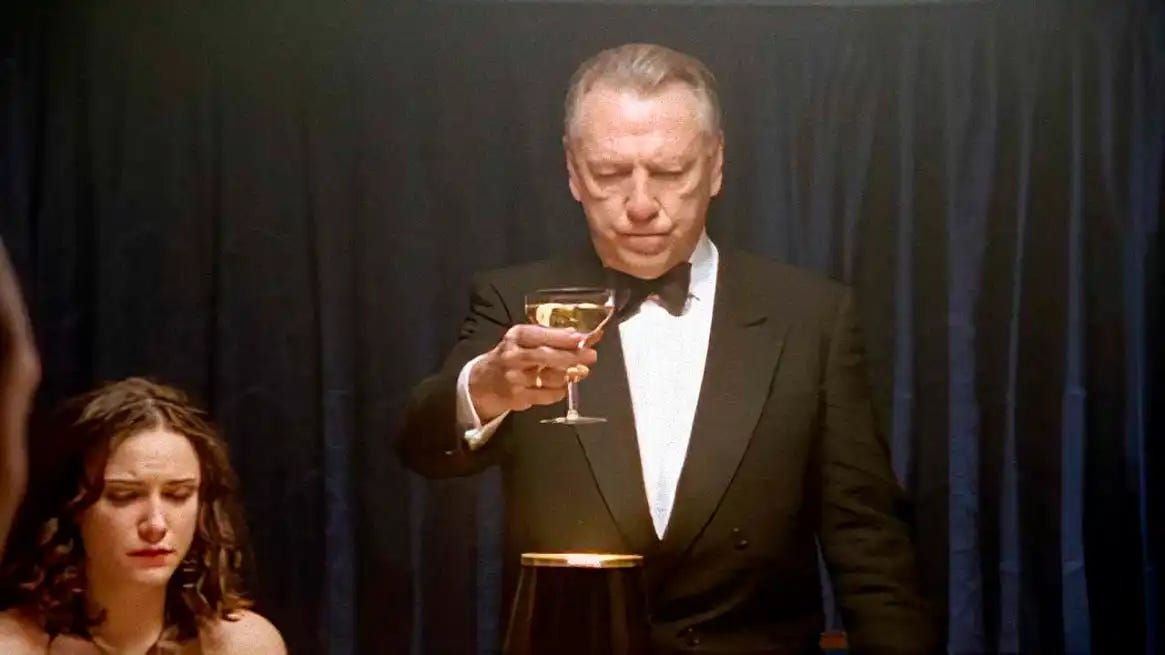
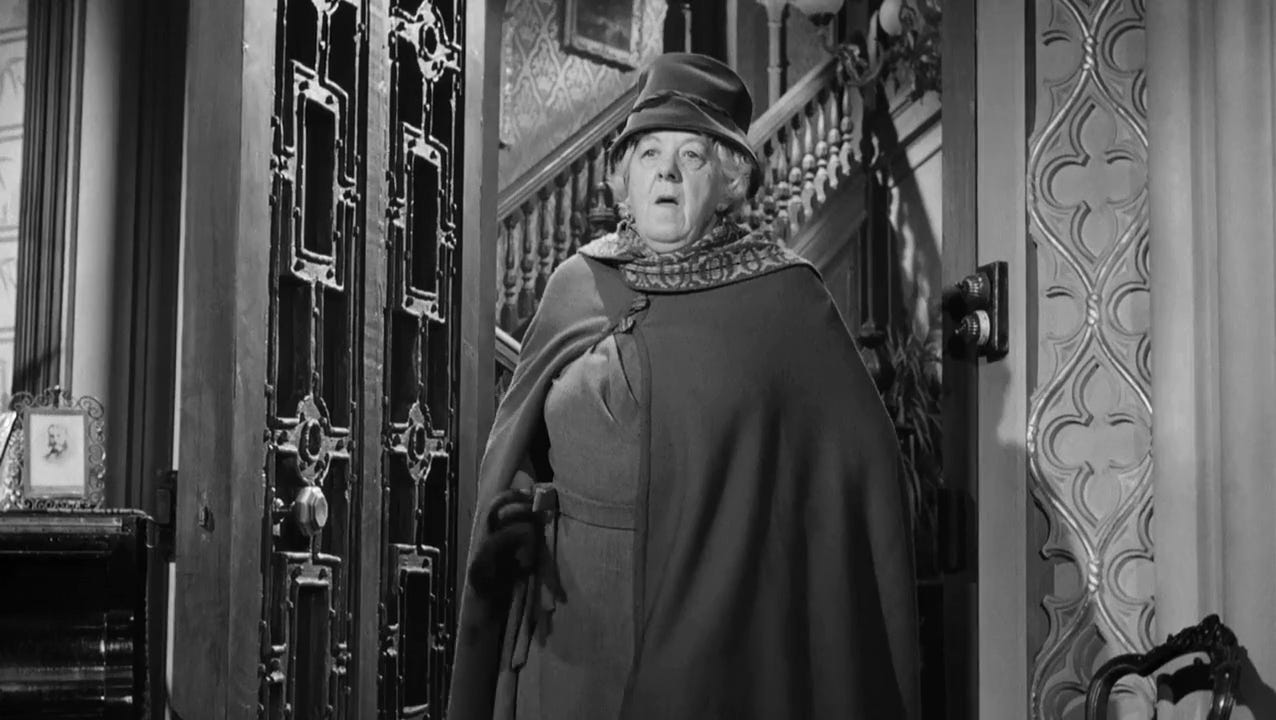
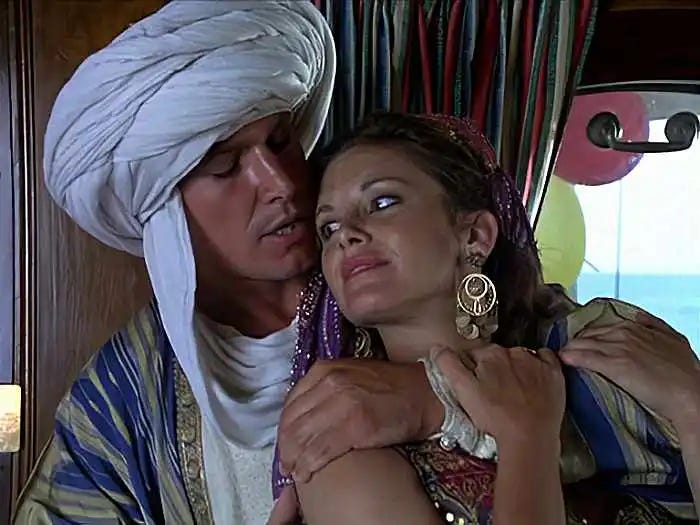
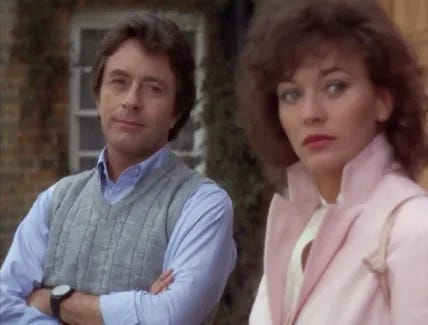
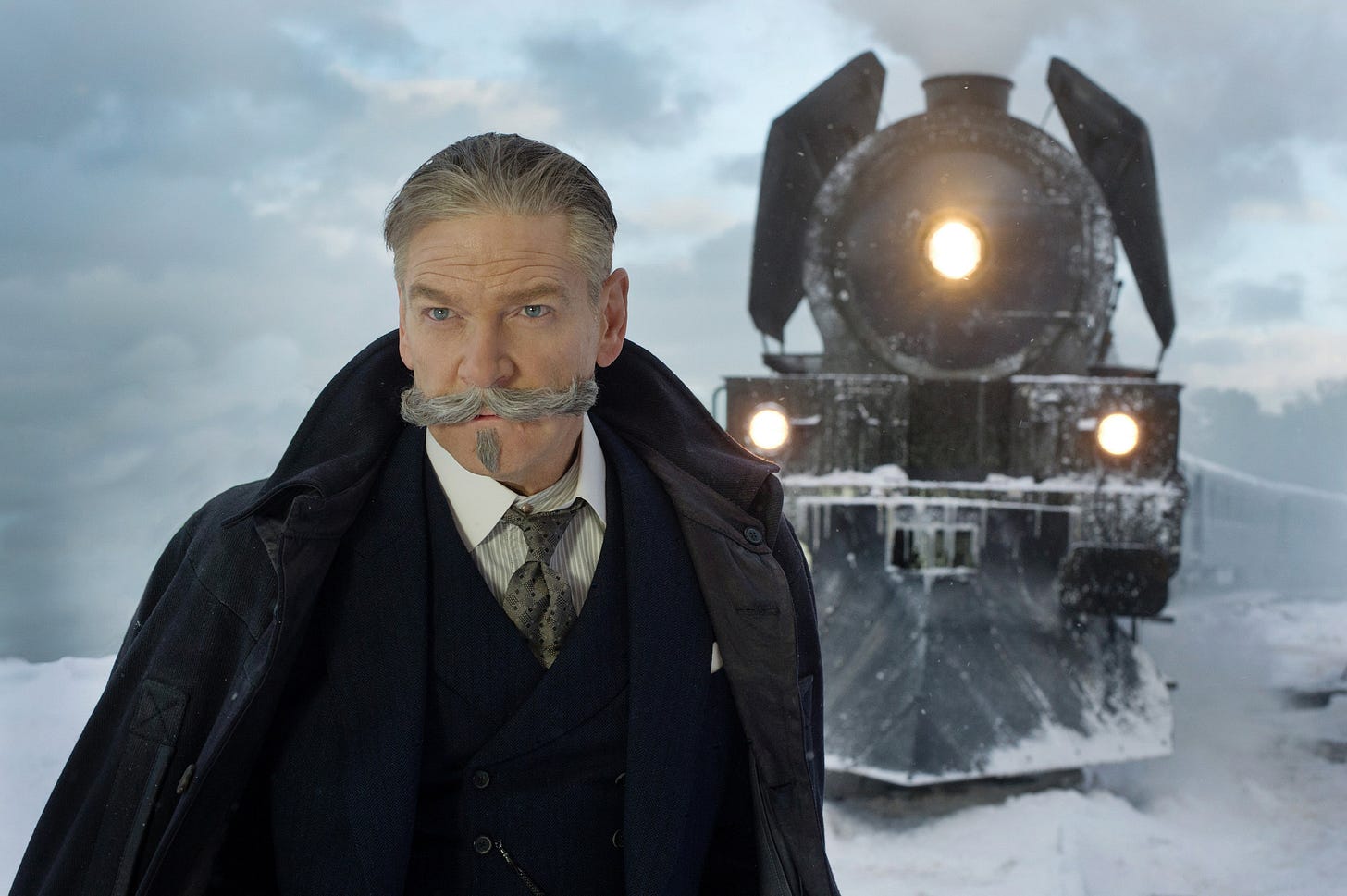
I agree *so strongly* about the Branagh Orient Express! I thought I was the only one....
Sparkling cyanide? Clearly there wasn’t enough to go round.